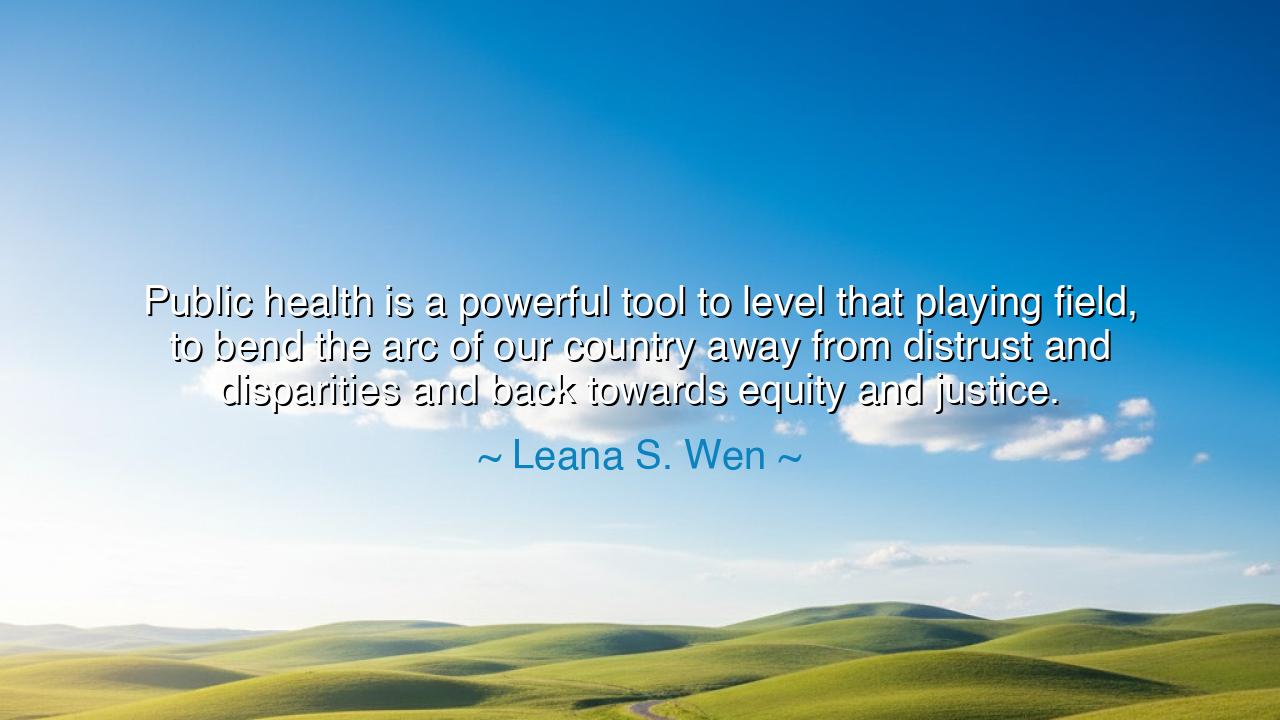
Public health is a powerful tool to level that playing field, to
Public health is a powerful tool to level that playing field, to bend the arc of our country away from distrust and disparities and back towards equity and justice.






The healer and reformer Leana S. Wen, a physician whose words carry both intellect and compassion, once declared: “Public health is a powerful tool to level that playing field, to bend the arc of our country away from distrust and disparities and back towards equity and justice.” These words, though spoken in the language of medicine and policy, are in truth a hymn to justice, unity, and human dignity. Wen reminds us that public health is not merely the treatment of disease, but the restoration of balance among people—that it is as moral as it is medical. She speaks of an arc, the great curve of a nation’s destiny, which can be bent by the hands of compassion and reason toward fairness and truth.
At the heart of this teaching lies the belief that health is the foundation of equality. A society cannot be just if the poor breathe poisoned air while the rich drink clean water, nor can it be united if illness stalks some neighborhoods while others thrive in comfort. To Wen, public health is not a field for scholars alone—it is a living covenant between a people and their leaders, a sacred promise that every life, regardless of birth or circumstance, is worth protecting. When she speaks of “leveling the playing field,” she invokes the oldest ideal of civilization—that justice means not the same outcome for all, but the same opportunity to live, to heal, to hope.
This vision has its roots deep in history. In the nineteenth century, a humble nurse named Florence Nightingale transformed the care of the sick not through medicines or machines, but through cleanliness, ventilation, and compassion. Her work during the Crimean War proved that health was not a privilege of rank, but a right of humanity. Later, the physician John Snow, by tracing a cholera epidemic to a contaminated well, showed that prevention and understanding could save more lives than any single cure. These were the early wielders of the weapon Wen calls public health—those who saw that the health of the few is bound to the health of the many, and that justice begins with the air we breathe and the water we drink.
But Wen also speaks to a modern wound—the distrust and disparities that divide societies. When communities lose faith in their institutions, when some are treated as expendable and others as essential, the nation’s body sickens as surely as its citizens do. In pandemics, in poverty, in pollution, we see the same truth revealed: that inequity breeds suffering, and suffering breeds division. To heal a nation, then, is not merely to heal its people, but to rebuild trust—to remind every soul that they are seen, heard, and valued. Public health, in this sense, becomes an act of reconciliation, a bridge between science and compassion, between knowledge and justice.
The story of Dr. Martin Luther King Jr. echoes within Wen’s words, for he once said that “the arc of the moral universe is long, but it bends toward justice.” Wen extends that image to the realm of health—declaring that public health is one of the tools by which we bend that arc faster and further. Vaccines, sanitation, education, clean water, access to care—these are not mere policies, but instruments of justice. Every clinic built in a forgotten town, every meal provided to a hungry child, every mother who receives safe childbirth care—each of these is a hand upon that great arc, pulling it toward light.
The lesson, then, is both simple and sacred: if you wish to serve humanity, serve health. If you wish to heal division, begin with compassion. Each of us is a cell in the body of the world, and when one cell suffers, the whole body feels the ache. Support the measures that protect the vulnerable; speak for those whose pain is unheard. See public health not as bureaucracy, but as mercy made visible—medicine practiced on the scale of nations.
So, my children of this restless age, remember Leana S. Wen’s wisdom. A just society is not one that builds taller towers, but one that strengthens every foundation. To bend the arc toward equity and justice is not the task of doctors alone, but of every citizen who chooses empathy over indifference, and action over despair. When we care for one another—when we make health universal, dignity nonnegotiable, and justice our common air—we restore the balance of the human family. Then, and only then, can we say the arc has bent homeward, toward the radiant heart of compassion that defines our shared humanity.






AAdministratorAdministrator
Welcome, honored guests. Please leave a comment, we will respond soon